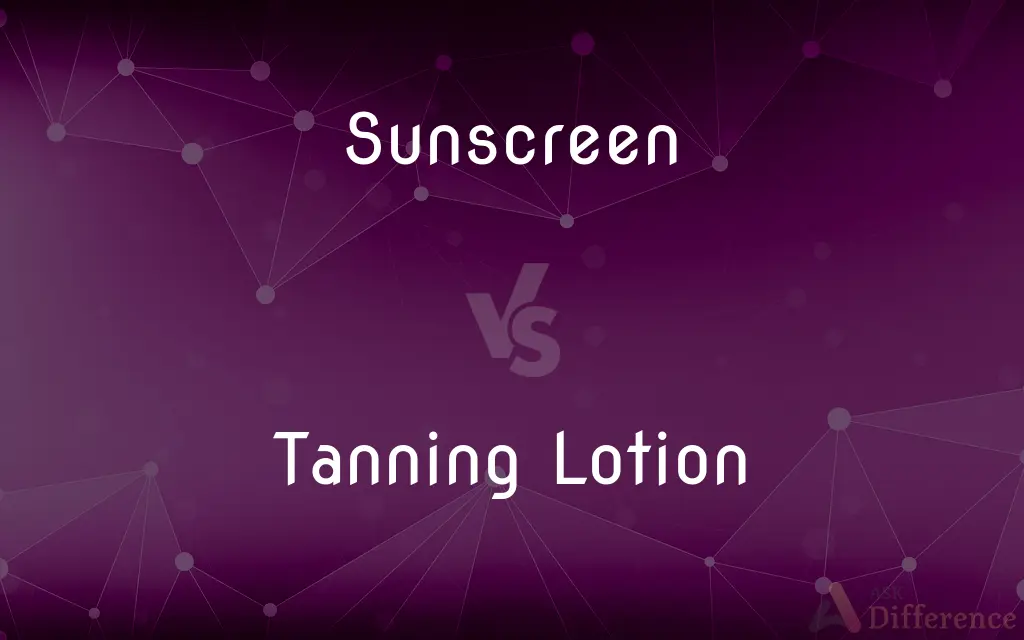Sunscreen vs. Tanning Lotion — What's the Difference?
By Tayyaba Rehman — Published on November 15, 2023
Sunscreen protects skin from harmful UV rays, preventing burns and skin damage. Tanning lotion enhances skin's ability to tan, with some offering minimal protection. Both address sun exposure differently.

Difference Between Sunscreen and Tanning Lotion
Table of Contents
ADVERTISEMENT
Key Differences
Sunscreen and Tanning Lotion are both topical applications for the skin. While they might appear similar, they serve very different purposes. Sunscreen is specifically designed to shield the skin from the sun's ultraviolet (UV) rays, which can cause sunburn, early aging, and increase the risk of skin cancer. Tanning Lotion, on the other hand, is formulated to increase the skin's melanin production and amplify UV effects, thereby helping the skin tan faster.
Sunscreen often comes with a Sun Protection Factor (SPF) rating. The SPF indicates the extent of protection from UVB rays. A higher SPF offers more protection. Tanning Lotion does not typically offer significant SPF protection, though some might contain minimal SPF. It's more focused on enhancing the tanning process, either by increasing melanin production or by bronzing the skin.
Sunscreen is a vital skincare product for daily use, especially when spending extended periods outdoors. Its regular use can prevent sunburn and reduce the risk of skin cancer. Tanning Lotion, while popular among those seeking a sun-kissed glow, can accelerate the effects of the sun and potentially increase the risk of skin damage if used without adequate sun protection.
Both Sunscreen and Tanning Lotion come in various forms, including sprays, lotions, gels, and sticks. Regardless of the product type, it's essential to follow application instructions carefully. Sunscreen should be reapplied regularly, especially after swimming or sweating. Tanning Lotion might need reapplication to maintain the desired tan level.
Comparison Chart
Primary Purpose
Protects skin from UV rays
Enhances the skin's tanning process
ADVERTISEMENT
Contains SPF
Usually, with various SPF levels
Some do, but generally low SPF
Usage Frequency
Daily, especially when outdoors
As desired for tanning sessions
Effect on Skin Aging
Can reduce premature skin aging
Might accelerate if used without sun protection
Associated Health Benefits
Reduces risk of sunburn and skin cancer
Can increase risk if used without protection
Compare with Definitions
Sunscreen
A topical product offering sunburn protection.
This sunscreen has SPF 50, providing ample protection.
Tanning Lotion
A topical application aiding in achieving a sun-kissed glow.
Before using the tanning bed, she applied her favorite tanning lotion.
Sunscreen
A formulation blocking harmful solar rays.
Ensure your sunscreen offers both UVA and UVB protection.
Tanning Lotion
A cosmetic to accelerate the sun-tanning process.
Some prefer tanning lotion with a bronzer for an instant glow.
Sunscreen
A lotion that shields skin from UV radiation.
Always apply sunscreen before heading to the beach.
Tanning Lotion
A product enhancing melanin production in the skin.
Using tanning lotion, he hoped to get a bronzed look faster.
Sunscreen
A skincare essential during prolonged sun exposure.
For hiking, pack water, snacks, and plenty of sunscreen.
Tanning Lotion
A lotion amplifying the skin's tanning response.
She applied tanning lotion to achieve a deeper tan.
Sunscreen
A barrier preventing UV-induced skin damage.
Sunscreen can prevent premature aging caused by sun exposure.
Tanning Lotion
A formulation aiding skin's response to UV exposure.
Ensure you have some sun protection when using a tanning lotion outdoors.
Sunscreen
A preparation, often in the form of a cream or lotion, used to protect the skin from the damaging ultraviolet rays of the sun.
Sunscreen
A cream, to be spread on the skin, containing organic compounds that absorb, and/or titanium dioxide that reflects the sun’s ultraviolet radiation.
Sunscreen
A cream spread on the skin; contains a chemical (as PABA) to filter out ultraviolet light and so protect from sunburn
Common Curiosities
Is sunscreen necessary on cloudy days?
Yes, UV rays can penetrate clouds; it's essential to wear sunscreen even on overcast days.
Can I achieve a tan while wearing sunscreen?
Yes, sunscreen slows tanning but doesn't entirely prevent it.
Is tanning lotion a substitute for sunscreen?
No, tanning lotion is for enhancing tans, not significant UV protection.
Should I use both sunscreen and tanning lotion together?
You can, but apply sunscreen first and ensure you're protected.
How long does it take for tanning lotion to show effects?
It varies, but some effects can be seen immediately, especially with bronzers.
Is SPF in tanning lotions enough for protection?
Generally, the SPF in tanning lotions is lower; additional sunscreen might be needed.
How often should I reapply sunscreen?
At least every 2 hours and after sweating or swimming.
Can tanning lotion cause skin damage?
Without sun protection, prolonged UV exposure can damage skin, even with tanning lotion.
Is tanning lotion necessary for a tan?
No, but it can help achieve a tan faster and more evenly.
Why do some tanning lotions have a tingling sensation?
Some have ingredients causing increased blood flow, accelerating the tanning process.
Can I use tanning lotion in tanning beds?
Some lotions are formulated specifically for tanning beds; always check the label.
Are there natural or organic tanning lotions?
Yes, several brands offer natural or organic tanning lotion formulations.
Can I use sunscreen on my face?
Yes, but opt for a formulation designed for facial use to prevent breakouts.
Does sunscreen expire?
Yes, check the expiration date and ensure it's stored in a cool place.
Does a higher SPF mean better protection?
Higher SPF offers more protection, but no sunscreen can block 100% of UV rays.
Share Your Discovery

Previous Comparison
Foreclosure vs. Short Sale
Next Comparison
Guinea Pig vs. HamsterAuthor Spotlight
Written by
Tayyaba RehmanTayyaba Rehman is a distinguished writer, currently serving as a primary contributor to askdifference.com. As a researcher in semantics and etymology, Tayyaba's passion for the complexity of languages and their distinctions has found a perfect home on the platform. Tayyaba delves into the intricacies of language, distinguishing between commonly confused words and phrases, thereby providing clarity for readers worldwide.











































